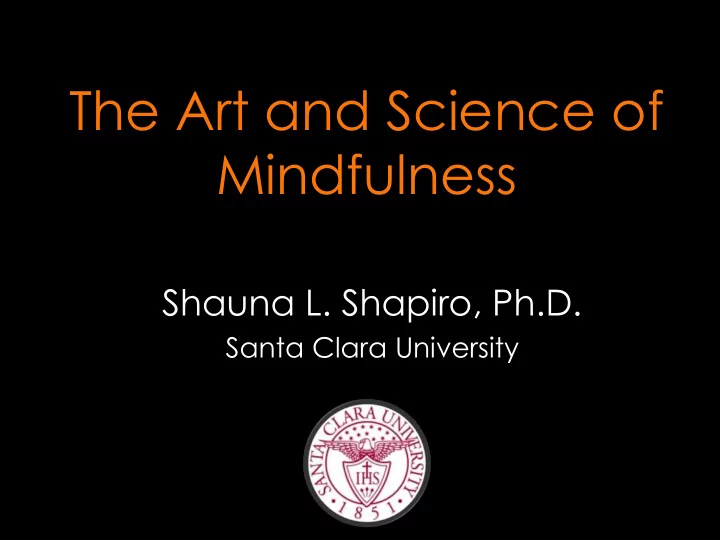

The Art and Science of Mindfulness Shauna L. Shapiro, Ph.D. Santa Clara University
46.9%
Mindfulness
“to see clearly �
ATTENTION
WHY - INTENTION ATTENTION HOW - ATTITUDE
Tripartite Model of Mindfulness Intention Attitude Attention
INTENTION What is most important?
ATTITUDE How we pay attention
What you practice grows stronger
NEUROPLASTICITY
Mindfulness and the Brain
A Randomized Controlled Trial
Happiness Set Point 7 6 Win Lottery 5 Paralyzed for life 4 3 2 YR: 0 1 2 3 4 5 1
A HOPEFUL MESSAGE Although changing exterior circumstances does not change our happiness. Changing our interior landscape can.
Mindfulness and Neuroplasticiy
THIS MOMENT MATTERS.
And yet practice is not about becoming PERFECT
Mindfulness is not a Self-Improvement Project
Self-Improvement vs. Self-Liberation
Jackson Appendix Story
The word compassion in Tibetan is considered incomplete if it does not include oneself. True compassion always includes ourselves.
If you can remain perfectly calm in traffic… If you see others succeed without a tinge of jealousy, If you can love everyone around you unconditionally, If you can always be cheerful just where you are You are probably …
A dog!
Mindfulness Meditation Practice
Dyads
Seamless Continuity of Practice • What did you notice? • What was your experience? • How did you relate to your experience? St aying connected to your body, cultivate a continuity of mindfulness as you share.
Key Themes slowing accept v Shifting down resistance perspective Suspending Self- judgment compassion
Slowing down Good Samaritan Study When we are hurried, stressed, scared we lose touch with our natural compassion. Mindfulness helps us slow down, see clearly and stay connected to our deepest values.
Acceptance v Resistance ! Suffering arises when we resist what is. ! Mindfulness, instead of trying to change our experience , simply adds the � resonance of awareness � to what is already here. ! We can accept what is here (because it is already here), see it clearly, and consciously respond.
Shifting Perspective Rotation in consciousness from subject to object. “The phenomena contemplated are distinct from the mind contemplating them.” D.Goleman
Wise Being Meditation
Suspend Judgment Suspend Judgment
Self-Compassion A clinical example: Mindfulness for PTSD. Learning to welcome all of our experience with compassion… even the seemingly unforgiveable.
The bud stands for all things, even for those things that do not flower, for everything flowers, from within, of self-blessing; though sometimes it is necessary to reteach a thing its loveliness, to put a hand on its brow and retell it in words and in touch it is lovely until it flowers again from within, of self-blessing Galway Kinnell
The word compassion in Tibetan is considered incomplete if it does not include oneself. True compassion always includes ourselves.
The heart pumps blood to itself first before pumping blood to the rest of the body.
Metta Meditation May I be peaceful May I be happy May I be healthy May I be free
Our task must be to free ourselves by widening our circle of compassion to embrace all living creatures and the whole of nature in its beauty.
Buddhist concepts of interpenetration hold that all phenomena are intimately connected; Indra’s net symbolizes a universe where infinitely repeated mutual relations exist between all members of the universe. All life is interrelated, and we are all caught in an inescapable network of mutuality, tied in a single garment of destiny.
Intention
Thank you for your kind attention.
Resources www.drshaunashapiro.com www.soundstrue.org Jack Kornfield, Jon Kabat-Zinn, Tara Brach, Dan Siegel, Thich Nhat Hanh, Pema Chodren, Ekhart Tolle
Recommend
More recommend